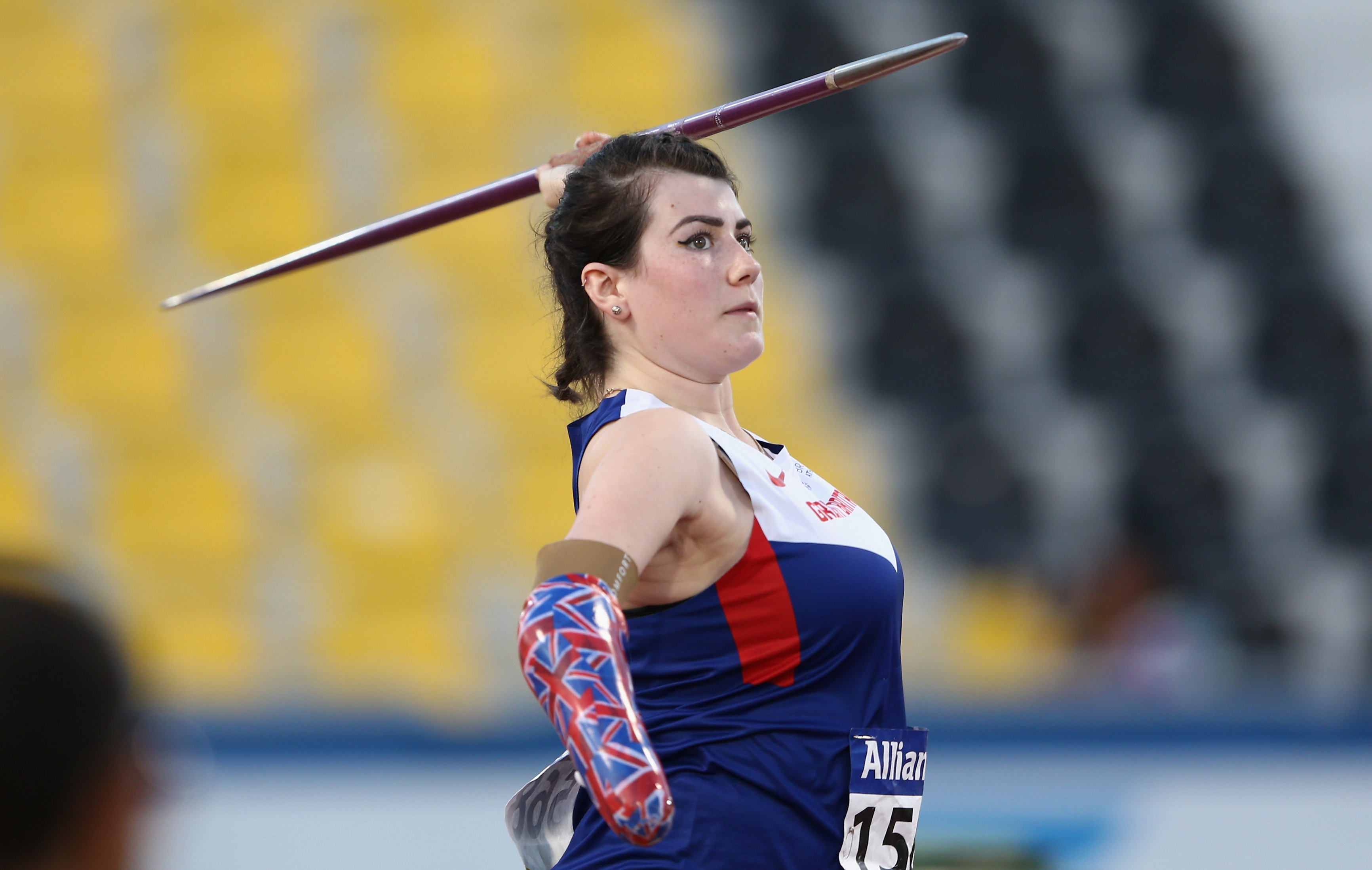
12th May 2017
Hollie Arnold Q&A
Hollie Arnold (coach: David Parker) is to receive her MBE today following her sporting heroics at last summer’s Paralympic Games in Rio, Brazil where her round six throw in the F46 javelin sailed out to 43.01m, smashing her own World Record and landing gold for the British team.
In the Q&A below, Hollie talks about her pathway into athletics, as well as what she hopes to achieve moving forward.
How did you get into athletics, and, in particular, throwing?
I’ve always been a really sporty girl, and I’ve got something of a sporting background; my Dad used to football, cricket, rugby and anything else he could think of, so I think that rubbed off on me.
I originally started swimming, and I really really enjoyed it, but I didn’t fancy the 5am starts in the morning! In terms of the javelin specifically, the first time I came into contact with it as a discipline was at an event called Star Track in Cleethorpes (Grimsby) in 2006. The idea was that you could just turn up and try all number of events, and my brother went along and picked up the javelin. Me being the little sister, I obviously wanted to copy him, so I picked up the javelin and threw it, and I remember thinking that it seemed to travel quite far.
Literally from that day I joined the Cleethorpes Athletics Club and got involved in able-bodied competitions. From there on in I continued with competing and ended up being picked up by British Athletics to compete at Beijing 2008 [Paralympic Games], which was quite a bit of a jump from just starting out in javelin to then going to my very first Paralympic Games at 14 years old.
Was there ever a feeling of ‘this is my true talent’ and/or ‘could this be my future’?
I really enjoyed the sport and it just brought something out in me – it allowed me to accept myself and compete against able bodied athletes, and I felt comfortable doing that.
I guess back then [at the age of 14] I must have had something about me, because you don’t typically just get picked to go to a Paralympic Games at that age, but there was a standard to achieve greatness, and I knew that I really wanted to push that and do that as a career following Beijing.
As someone who has now competed at three Paralympic Games [Beijing, London & Rio], how do you feel the Paralympic movement has come along in the time since 2008?
In Beijing I think my event was shown at 4am – my Mum and Dad came out with me to watch, but the rest of my family were back home, and nothing was really publicised that much around the Paralympics at that stage in time.
London was such a massive hit of realisation in regards to people thinking ‘wow, this is amazing’ – the fact it was on home turf added to that.
I thought Rio was amazing too; as a team, we smashed it – but I think London was absolutely vital for us when it came to showcasing what we as athlete were about.
You’re still only 22 years old….what does the future hold?
Tokyo [host of the 2020 Olympic & Paralympic Games] is obviously the next aim as far as a Paralympic Games go, and then whatever comes after that – it seems a lifetime away yet.
Ultimately it all comes down to staying healthy and avoiding injury; in terms of technical events, javelin is one of the hardest disciplines when it comes to staying fit and healthy.
I’m only 22 but I feel like I’m a bit of a veteran now – I guess being in the situation I am, as Paralympic champion, with so much more to come is really exciting.
As a Paralympic and World champion as well as holding the F46 World Record, how do you now stay motivated?
To be honest, after Rio all my emotions came out in different ways – I’d been working since Beijing to achieve what I did, and breaking the world record having had a shoulder injury before Rio meant there was a lot to take on in mind, so it was difficult at times to capture that motivation post-Rio.
In saying that, as soon as January rolled around it my mind-set snapped in; the World Para Athletics Championships in London is creeping up on us, and my aim is to go out there and replicate what I did in Rio. In 2018 there’s the Commonwealth Games; my event has never been in the Commonwealths before, so that’s another exciting competition to look ahead to.
On beginning to work with David Parker after the 2016 Paralympic Games:
We went out to Finland at the end of November for 10 days; that was fantastic and a really good eye-opener for me as to how I can adapt and push myself more in certain ways to become better than I am, and ultimately that was the main reason behind the change.
We’ve got a new four year cycle ahead of us and it’s exciting for both myself and David – the aim from both of us is to push the boundary when it comes to competing with and against able-bodied athletes, so hopefully we can achieve that.



